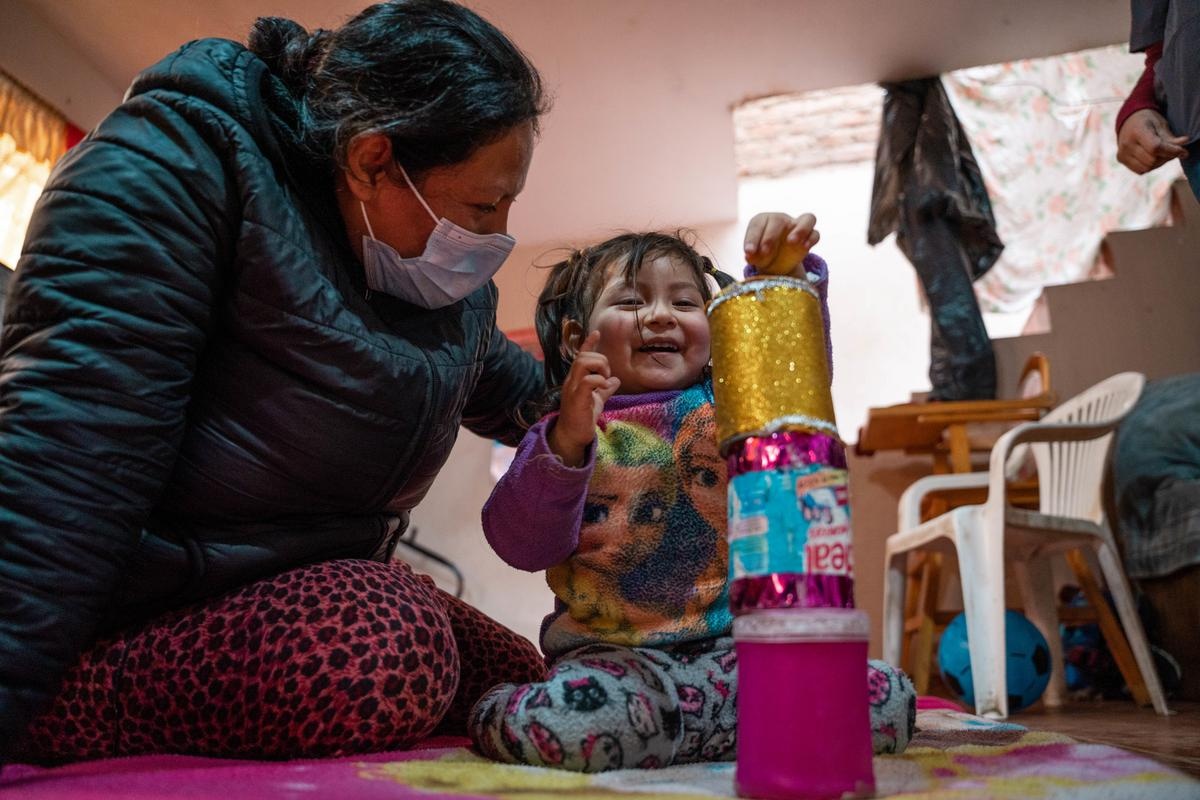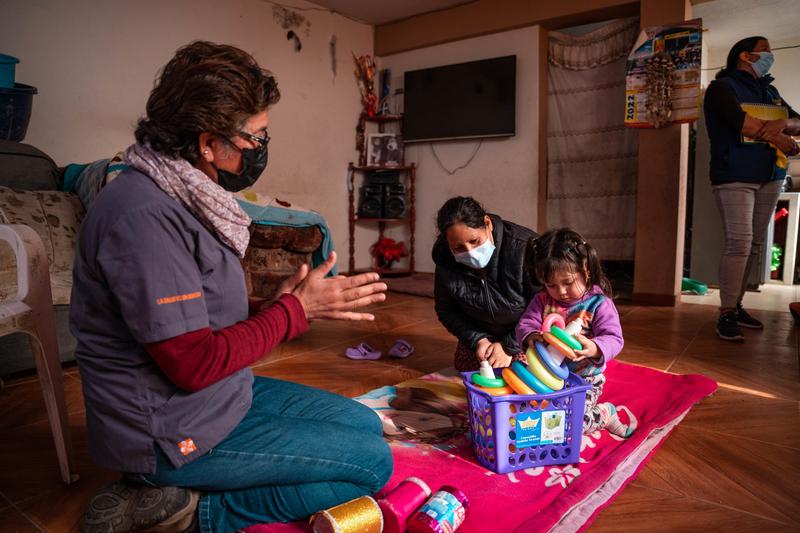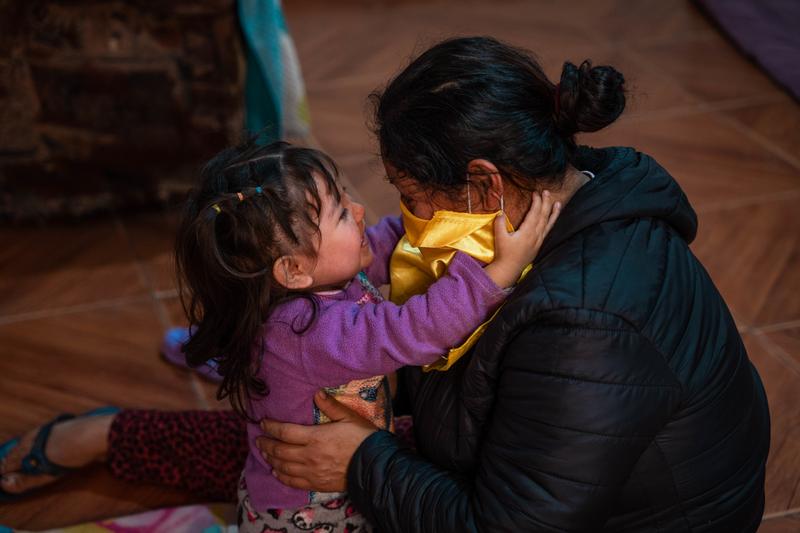Supporting Caregivers and Children In Peru
CASITA program helps children with developmental delays
Posted on Aug 23, 2022

Hugs and kisses weren’t always part of Carmen Dávalos' daily routine with her daughter. But now, the 35-year-old mother takes every opportunity she can to shower her daughter, Yeretzy, with affection.
No one had ever taught Dávalos, who had her first child at 18 years old, the importance of showing affection in a child’s development. It was a lesson she learned from Socios En Salud, as Partners In Heath is known in Peru, as part of the CASITA program.
Socios En Salud has worked in Peru since 1994, when it responded to a deadly outbreak of multidrug-resistant tuberculosis. In the years since, it has expanded its work to provide medical care and social support to hundreds of thousands of patients in Lima and beyond.
Since 2013, Socios En Salud has supported children and caregivers through CASITA—a three-month program that identifies children ages 6 to 24 months who are at risk of developmental delays and helps them learn skills through play.
CASITA has enrolled 3,648 children and screened 6,795 since it began in Carabayllo, a district in northern Lima where high rates of poverty and domestic violence put children and their health at risk. Eighty-five percent of children showed improvement during the pilot program, which supported 180 families from 2013 to 2016.
Dávalos heard about CASITA last year, as she received follow-up care at La Flor clinic through Socios En Salud’s support. Staff had observed that Yeretzy, then a little over a year old, was very shy, fearful of others, and lacked the social, motor, and coordination skills of most children her age. They encouraged Dávalos to fill out a screening questionnaire for the CASITA program via chatbot.
Just a few days later, María Berrocal, one of 262 community health workers hired and trained by Socios En Salud, visited Dávalos and her daughter at home to carry out an evaluation, using games such as building a tower of cubes and playing with puppets to assess Yeretzy’s skills. Berrocal determined Yeretzy was eligible for the program and helped Dávalos join a WhatsApp group for caregivers.
Then the classes began.

Each week, Dávalos and other caregivers in the program received a recorded lesson to review and practice with their children at home. The classes covered a range of topics—motor skills, coordination, social skills—and incorporated games like hide-and-seek and toys made from household items. Dávalos completed the lessons with Yeretzy, often with the help of her husband and three other children.
With each lesson, Dávalos watched her daughter grow her skills and confidence. Yeretzy learned to tear sheets of paper. She built a tower of cubes and organized the pieces according to size. She imitated the sounds and actions of her mother.
Dávalos shared photos and videos with the WhatsApp group to document Yeretzy’s progress and receive feedback.
“Every week, we could see how she progressed,” says Berrocal.
Yeretzy wasn’t the only one learning.
“It has taught me a lot,” says Dávalos. “Hugs and kisses and caresses should never be missing. We must always show them without shame and attend to [our children's] needs.”
She began to sing for her daughter—something she had once been too embarrassed to do.
“Seeing the mothers in the WhatsApp group singing to their children…motivated me to do it,” she says. “I managed to sing in my house in front of my whole family, without problems or embarrassment.”
She hadn’t always felt so free.
Her pregnancy with Yeretzy began in December 2019, just months before COVID-19 sent the nation into four months of lockdown. She caught the virus in June, six months pregnant and unvaccinated, isolating her at home and sending her into a deep depression.
During that time, Socios En Salud continued to provide maternal health care, monitoring her pregnancy virtually, and connected her with mental health care, including therapy. That support came as a lifeline for Dávalos—and it continued after her daughter was born.

Early detection of developmental delays is crucial in helping children access the care and support they need to become healthy, independent adults. But the pandemic, marked by quarantine, social distancing and disruptions in care, complicated efforts to identify at-risk children, even as it hamstrung their development.
Only 28% of children under 36 months are up to date on their growth and development checks due to the pandemic, according to Peru’s Ministry of Health. More than half of children between 9 and 12 months old have not developed an adequate bond of trust, security, and emotional stability with their mothers.
Lesson by lesson, Dávalos was determined to defy those odds.
“Every week, with each game, I was able to connect with my daughter,” she says.
Now, Yeretzy is no longer scared. She smiles at strangers. She laughs and poses for the camera. In Berrocal’s words: “She is pure joy.”
Dávalos has only to look at her daughter’s face to see the difference.
“She is everything to me,” she says. “Seeing her now, as a happy and fulfilled child, is what fills my heart the most.”

